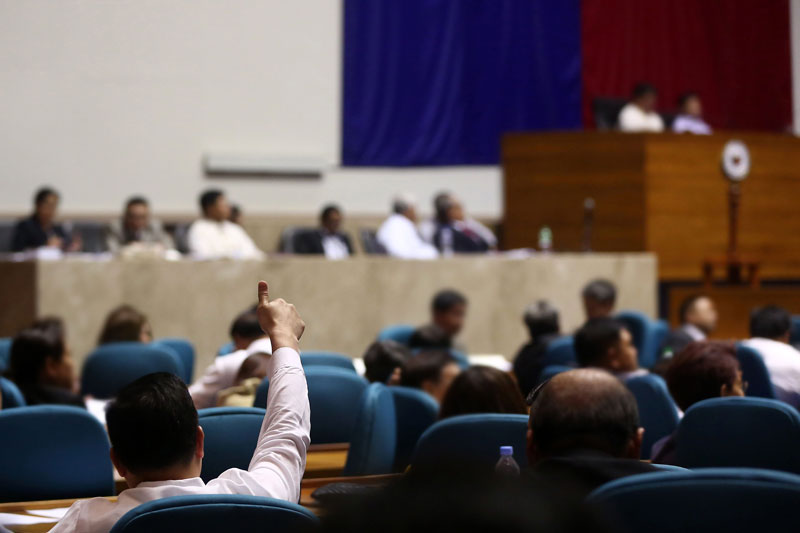Consultative committee votes to regulate, not ban political dynasties

Members of the consultative committee (Concom) yesterday voted to include a self-executing provision prohibiting relatives of the president down to barangay captain from succeeding their relatives. Miguel de Guzman
MANILA, Philippines — Political dynasties in the country will be regulated under the proposed federal government.
Members of the consultative committee (Concom) yesterday voted to include a self-executing provision prohibiting relatives of the president down to barangay captain from succeeding their relatives.
The provision covers relatives within the second degree of consanguinity or affinity. It includes the incumbent officials’ spouses, children, parents, grandparents, siblings, grandchildren and their spouses, parents-in-law, siblings-in-law and their spouses, and grandparents-in-law.
During the full session, 19 out of 20 members were present. Fr. Ranhilio Aquino, dean of San Beda Graduate School of Law, was the only member absent.
The first matter that the Concom voted on was whether to totally ban political dynasties or just regulate these.
Ten voted to just regulate, while nine voted for a total ban.
Former senate president Aquilino Pimentel Jr. voted for a total ban of political dynasties.
As to the degree of consanguinity, there was a tie between coverage up to second degree and up to fourth degree and one vote for third degree.
Due to the tie, a run-off vote was conducted, in which the coverage up to the second degree won by just one vote.
How about the mistresses, paramours?
However, the Concom is yet to vote on whether the regulation will also cover the domestic partners, mistresses and paramours of elected officials.
The Concom members are also yet to vote on how the regulatory provision will apply when two or more relatives of an elected official will run for different positions in the same election cycle.
Concom chairman Reynato Puno, retired chief justice, yesterday postponed the voting on these issues. The committee will vote on these matters today.
Puno reminded that the self-executing constitutional provision against political dynasties is important.
“If we shift to federalism, we cannot give powers to the states or regions, whichever we call them, where political dynasties rule,” he added.
Palace: Political families not bad
President Duterte’s family is influential in Davao City, where he served as mayor for more than two decades. Duterte’s daughter Sara is mayor of the city while his son Paolo used to be vice mayor.
Malacañang said it respects the decision of the Concom to review the 1987 Constitution to push for the regulation of political dynasties, but stressed that the presence of political families is not bad in itself.
“I think the sentiment of the President himself is he doesn’t consider political dynasties as bad per se. He has said that sometimes they can lead to good results,” presidential spokesman Harry Roque said in a press briefing yesterday.
“But we respect and defer to the wisdom of the consultative commission, and we hope that Congress will consider this particular recommendation,” he added.
‘Barangay, SK polls to change local leadership’
Meanwhile, poll watchdog Legal Network for Truthful Elections (LENTE) yesterday called on Congress to allow the barangay and Sangguniang Kabataan (SK) elections to push through as scheduled to pave the way for change in local leadership and test the anti-political dynasty provision of the SK Reform Law.
LENTE noted that incumbent barangay officials have been in position for five years and it is high time to elect new officials who will govern in the next three years.
The group also noted that in the past three major elections, the country saw greater concentration of seats with the ruling powers and families.
The new SK Reform Law prohibits sons, daugthers, nephews and nieces of incumbent politicians from running in the barangay elections.
“It is time for new blood to be part of our political structure and this is where the role of SK elections and youth representation become important,” LENTE said in a statement.
“For the first time, the entry of new blood in our political structure can become a reality in the May barangay and SK elections,” the group said.
LENTE further noted that postponing the scheduled elections for the third time is contrary to the standard of regular elections.
“The conduct of regular elections is one of the core foundations of democracy as citizens exercise their right to choose who will govern over them,” LENTE explained.
“Regular elections ensure as well that elected officials will be held accountable to their constituents through the possibility of losing the next elections due to poor performance,” the group added.
LENTE also noted that having good barangay officials has also become more important.
“The barangay has a clear role in solving this problem and this can be made possible through the election of trustworthy barangay officials,” the group added. – Mayen Jaymalin, Alexis Romero
- Latest
- Trending



























